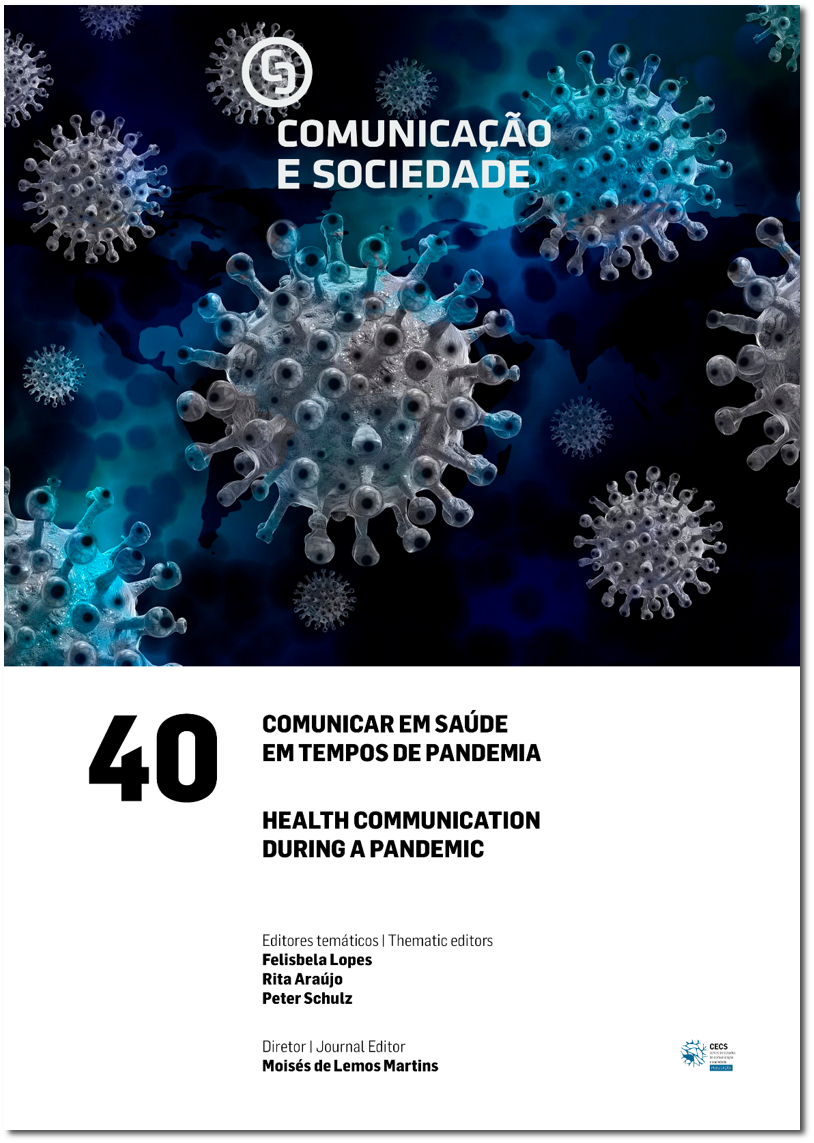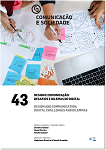Covid-19: A Pandemic Managed by Official Sources Through Political Communication
DOI:
https://doi.org/10.17231/comsoc.40(2021).3520Keywords:
covid-19, journalism, official news sources, health communicationAbstract
SARS-CoV-2 pandemic attracted a wide range of expert sources into journalism, especially those from the health field. Nonetheless, official sources (mainly politicians) did not become less visible. They were mainly decision-makers, even though decisions were not always well-communicated, which promoted entropy. Worldwide, countries adopted different strategies, some undergoing severe lockdowns and others rejecting restrictive measures — and that was often difficult to understand. The management of this pandemic was hard, not only due to the lack of technical knowledge but also due to the lack of cooperation and coordination amongst several stakeholders, such as governments, health authorities, or experts. In this research, we seek to understand the role of official sources in the Portuguese press during the emergency states. In order to do so, we analyzed two national newspapers, a reference newspaper (Público) and a mainstream newspaper (Jornal de Notícias) from March 18 to May 2, 2020, and from November 9 to December 23, 2020. Our corpus comprises 2.307 news pieces: 1.850 were published during the first emergency state, quoting 4.048 news sources, and 457 were published during the second emergency state, with 857 sources. We realized that official news sources are highly visible in the news, especially those from the government, such as the prime minister and a few other ministers. Although evidence recommends the appointment of an official spokesperson, that did not happen in Portugal, and it may have contributed to some lapses throughout 2020. By the end of the year, the country had an increase in covid-19 cases, and the hesitancy that characterized political decisions was also behind that.
Downloads
References
Almeida, S. J., & Botelho, L. (2020, 17 de março). Costa e Marcelo discordam sobre declaração de estado de emergência. Público. https://www.publico.pt/2020/03/17/politica/noticia/costa-prefere-estado-emergencia-tarde-1907984
Anjos, M. (2021, 25 de fevereiro). Ainda não deu para perceber que as reuniões do Infarmed não funcionam? Visão. https://visao.sapo.pt/opiniao/ponto-de-vista/em-sincronizacao/2021-02-25-ainda-nao-deu-para-perceber-que-as-reunioes-do-infarmed-nao-funcionam/
Araújo, R. (2017). Dinâmicas de construção do noticiário de saúde: Uma análise da imprensa generalista portuguesa [Tese de doutoramento, Universidade do Minho]. RepositóriUM. http://hdl.handle.net/1822/45761
Araújo, R. (2020, 3 de julho). Correr atrás do prejuízo. Público. https://www.publico.pt/2020/07/03/opiniao/opiniao/correr-atras-prejuizo-1922850
Daniel, C. (Anfitrião). (2021, 2 de fevereiro). Comunicar em pandemia (Temporada 2, Episódio 2) [Programa de televisão]. In É ou não é? - O grande debate. https://www.rtp.pt/play/p8396/e522038/e-ou-nao-e-o-grande-debate
Dunwoody, S. (2020). Science journalism and pandemic uncertainty. Media and Communication, 8(2), 471–474. https://doi.org/10.17645/mac.v8i2.3224
Fernández-Sande, M., Chagas, L., & Kischinhevsky, M. (2020). Dependence and passivity in the selection of information sources in radio journalism in Spain. Revista Espanola de Documentacion Cientifica, 43(3), 1–18. https://doi.org/10.3989/redc.2020.3.1712
Fielding, J. (2020, 31 de março). Good communication will help beat covid-19. The Hill. https://thehill.com/opinion/healthcare/490410-good-communications-will-help-beat-covid-19
Finset, A., Bosworth H., Butow P., Gulbrandsen, P., Hulsman, R. L., Pieterse, A. H., Street, R., Tschoetschel, R., & Van Weert, J. (2020). Effective health communication - A key factor in fighting the covid-19 pandemic. Patient Education and Counseling, 103(5), 873–876. https://doi.org/10.1016/j.pec.2020.03.027
Gans, H. J. (2004). Deciding what’s news: A study of CBS evening news, NBC nightly news, Newsweek, and Time. Northwestern University Press. (Trabalho original publicado em 1979)
Gomes, H., & Garcia, F. (2020, 12 de novembro). Covid-19. Costa reconhece falhas na comunicação: “A culpa é toda minha”. Concelhos de alto risco passam a ser 191. Expresso. https://expresso.pt/politica/2020-11-12-Covid-19.-Costa-reconhece-falhas-na-comunicacao-A-culpa-e-toda-minha.-Concelhos-de-alto-risco-passam-a-ser-191
Governo da República Portuguesa. (2021, 13 de janeiro). Conferência de imprensa do Conselho de Ministros, 13 de janeiro de 2021. República Portuguesa, XXII Governo. https://www.portugal.gov.pt/pt/gc22/comunicacao/multimedia?m=v&i=conferencia-de-imprensa-do-conselho-de-ministros-13-de-janeiro-de-2021
Lopes, F., Ruão, T., Marinho, S., & Araújo, R. (2011). Jornalismo de saúde e fontes de informação, uma análise dos jornais portugueses entre 2008 e 2010. Derecho a Comunicar - Revista Científica de La Associación de Derecho a La Información, (2), 101–120. http://132.248.9.34/hevila/Derechoacomunicar/2011/no2/6.pdf
Lopes, F., Araújo, R., Magalhães, O., & Sá, A. (2020). Covid-19: Quando o jornalismo se assume como uma frente de combate à pandemia. In M. Martins & E. Rodrigues (Eds.), A Universidade do Minho em tempos de pandemia: Tomo III: Projeções (pp. 205–233). UMinho Editora. https://doi.org/10.21814/uminho.ed.25.11
Lopes, M., & Botelho, L. (2020, 2 de novembro). Costa propõe a Marcelo estado de emergência mínimo e prolongado. Público. https://www.publico.pt/2020/11/02/politica/noticia/costa-propoe-marcelo-estado-emergencia-minimo-prolongado-1937626
Lusa. (2021, 4 de fevereiro). Covid-19. Graça Freitas justifica “desaparecimento” com nova estratégia de comunicação. Expresso. https://expresso.pt/coronavirus/2021-02-04-Covid-19.-Graca-Freitas-justifica-desaparecimento-com-nova-estrategia-de-comunicacao
Magalhães, O. E. (2012). Comunicação de saúde e fontes - O caso da Faculdade de Medicina da Universidade do Porto [Dissertação de mestrado, Universidade do Porto]. Repositório Aberto. https://repositorio-aberto.up.pt/handle/10216/66407
Martins, R. (2020, 10 de novembro). O que falhou na comunicação da pandemia? Público. https://www.publico.pt/2020/11/10/sociedade/noticia/falhou-comunicacao-pandemia-1938580
McGuire, D., Cunningham, J. E. A., Reynolds, K., & Matthews-Smith, G. (2020). Beating the virus: An examination of the crisis communication approach taken by New Zealand Prime Minister Jacinda Ardern during the covid-19 pandemic. Human Resource Development International, 23(4), 361–379. https://doi.org/10.1080/13678868.2020.1779543
Mendes, F. A. (2020, 12 de março). “Manda a prudência que determinemos a suspensão de todas as actividades lectivas presenciais”. Público. https://www.publico.pt/2020/03/12/politica/noticia/manda-prudencia-determinemos-suspensao-actividades-lectivas-presenciais-1907549
Monteiro, L. (2021, 23 de fevereiro). “Reuniões do Infarmed são um faz de conta que se ouve a ciência”. Renascença. https://rr.sapo.pt/2021/02/23/pais/reunioes-do-infarmed-sao-um-faz-de-conta-que-se-ouve-a-ciencia/noticia/227760/
Noar, S. M., & Austin, L. (2020). (Mis)communicating about covid-19: Insights from health and crisis communication. Health Communication, 35(14), 1735–1739,https://doi.org/10.1080/10410236.2020.1838093
Nutbeam, D. (2020). Covid-19: Lessons in risk communication and public trust. Public Health Research & Practice, 30(2), Artigo e3022006. https://doi.org/10.17061/phrp3022006
Pérez Curiel, C., Gutiérrez Rubio, D., Sánchez González, T., & Zurbano Berenguer, B. (2015). El uso de fuentes periodísticas en las secciones de política, economía y cultura en el periodismo de proximidad español. Estudios Sobre El Mensaje Periodístico, 21(0), 101–117. https://doi.org/10.5209/rev_esmp.2015.v21.50661
Ratzan, S. C., Gostin, L.O., Meshkati, N., Rabin, K., & Parker, R. (2020). Covid-19: An urgent call for coordinated, trusted sources to tell everyone what they need to know and do. NAM Perspectives. https://doi.org/10.31478/202003a
Ratzan, S. C., Sommarivac, S., & Rauh, L. (2020). Enhancing global health communication during a crisis: Lessons from the covid-19 pandemic. Public Health Research & Practice, 30(2), Artigo e3022010. https://doi.org/10.17061/phrp3022010
Reich, Z. (2011). Source credibility and journalism. Journalism Practice, 5(1), 51–67. https://doi.org/10.1080/17512781003760519
Reynolds, B., & Seeger, M. W. (2005). Crisis and emergency risk communication as an integrative model. Journal of Health Communication, 10(1), 43–55. https://doi.org/10.1080/10810730590904571
Ribeiro, V. (2006). Fontes sofisticadas de informação: Análise do produto jornalístico político da imprensa nacional diária de 1995 a 2005 [Dissertação de mestrado, Universidade do Porto]. Repositório Aberto. http://hdl.handle.net/10216/13047
Santos, P. C. dos. (2020, 23 de novembro). A comunicação em saúde no contexto da pandemia: Quando tudo serve para arma de arremesso político. Expresso. https://expresso.pt/opiniao/2020-11-23-A-Comunicacao-em-Saude-no-contexto-da-pandemia-quando-tudo-serve-para-arma-de-arremesso-politico
Santos, R. (1997). A negociação entre jornalistas e fontes. Minerva.
SIC Notícias. (2020, 9 de abril). Portugal é considerado um exemplo de boas práticas no combate à pandemia de covid-19. SIC Notícias. https://sicnoticias.pt/especiais/coronavirus/2020-04-09-Portugal-e-considerado-um-exemplo-de-boas-praticas-no-combate-a-pandemia-de-Covid-19
SNS | Portal do SNS. (2020, 22 de março). 22/03/2020 | Conferência de imprensa covid-19 [Video]. YouTube. https://www.youtube.com/watch?v=HaTa97ccZKc
Van Hout, T., Pander Maat, H., & De Preter, W. (2011). Writing from news sources: The case of Apple TV. Journal of Pragmatics, 43(7), 1876–1889. https://doi.org/10.1016/j.pragma.2010.09.024
Vraga, E. K., & Jacobsen, K. H. (2020). Strategies for effective health communication during the coronavirus pandemic and future emerging infectious disease events. World Medical & Health Policy, 12(3), 233–241. https://doi.org/10.1002/wmh3.359
World Health Organization. (2020). Covid-19: Global risk communication and community engagement strategy. https://www.who.int/publications/i/item/covid-19-global-risk-communication-and-community-engagement-strategy
Downloads
Published
How to Cite
Issue
Section
License
Copyright (c) 2021 Rita Araújo, Felisbela Lopes, Olga Magalhães

This work is licensed under a Creative Commons Attribution-NonCommercial 4.0 International License.
Authors own the copyright, providing the journal with the right of first publication. The work is licensed under a Creative Commons Attribution 4.0 International License.














